
views
- Eat 3 bananas a day to ease peptic ulcer pain. The nutrients in bananas, like potassium, magnesium, and other enzymes help fight ulcer-causing bacteria.
- Peel, crush, blend, or eat dried bananas to help their efficacy. This more quickly releases the beneficial enzymes.
- Eat other fruits and veggies, like kiwis, mangoes, and papayas. Avoid acidic fruits like oranges or tomatoes, which may worsen your symptoms.
Using Bananas and Other Foods to Prevent Ulcers

Eat three bananas per day. Adding three bananas to a healthy diet may help prevent ulcers and reduce ulcer pain. You can simply eat bananas, add them to a smoothie, or consume them any other way you may enjoy. Bananas are effective because they are high in potassium, magnesium, manganese, fiber, vitamins B6 and C, and folate. Some studies suggest they are high in an enzyme that helps stop the growth of the bacteria that causes stomach ulcers. It's thought that bananas may absorb some of the acidity in the stomach and they may have some antibacterial properties. It is recommended that you begin to eat three bananas per day as soon as you feel ulcer symptoms. You should continue eating three bananas per day until symptoms subside. If you suspect you have an ulcer, you should see your doctor. Bananas may help ease your symptoms, but they shouldn't be your first-line treatment.
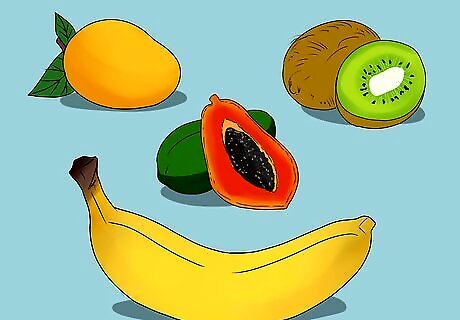
Combine bananas with other healthy foods. By combining bananas with a healthy lifestyle, you will have a better chance of preventing ulcers. In addition to bananas add other non-acidic fruit to your diet. Non-acidic fruits includes kiwi, mango and papaya. Also try lightly boiled vegetables like broccoli or carrots. You should eat more leeks, onion, oats, wheat and whole grain. These foods are rich in vitamins and will help to speed up the ulcer healing process. Bananas are high in carbohydrates, so pairing them with healthy fats and proteins can help to prevent blood sugar spikes/lows.
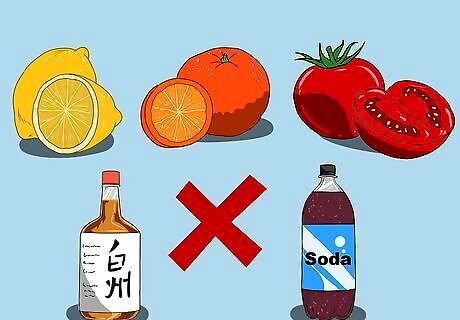
Avoid acidic fruits. Acidic fruits include oranges, peaches, berries and grapefruit. Acidic fruits will increase stomach acid and can irritate ulcers by breaking down mucus lining in the stomach. Try non-acidic fruits instead!
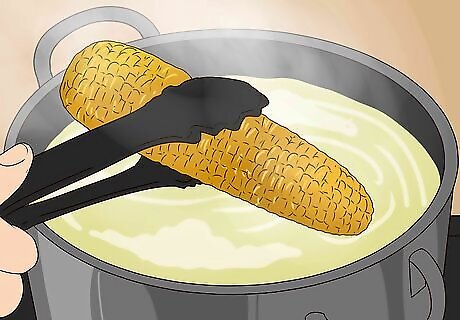
Cook your vegetables and do not eat them raw. Raw vegetables may be acidic, particularly corn, lentils, winter squash and olives. Again, acidic foods can irritate stomach ulcers.
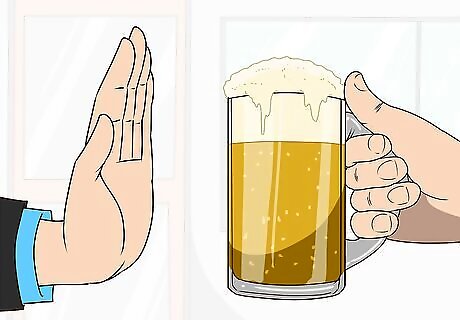
Limit your alcohol intake to a couple of drinks per day. Drinking in excess, that is more than a couple drinks per day, can actually promote the development of ulcers by interacting with the bacteria that causes ulcers, Helicobacter pylori (H. pylori). To reduce your alcohol intake try drinking more slowly, or tell a friend or loved one you will only be drinking two drinks per day to help with your ulcers. Never drink on an empty stomach as this will irritate peptic ulcers.
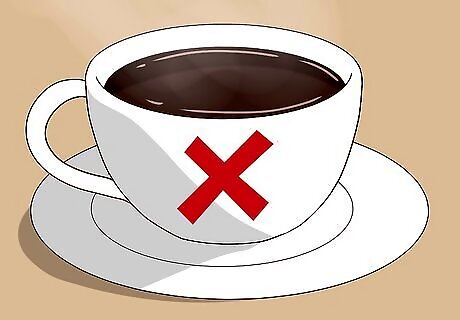
Cut back on coffee. It is popularly believed that coffee can cause ulcers, although medical research does not show a connection. However, the acidity in coffee may contribute to upset stomach. In fact, any beverage containing caffeine may irritate an existing ulcer. You may find relief for your peptic ulcer if you
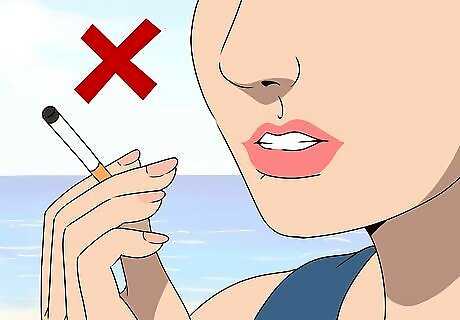
Avoid smoking. Smoking, much like drinking, can promote the development of ulcers by interacting with the bacteria that causes ulcers, Helicobacter pylori (H. pylori). By smoking you are increasing your chance of getting an ulcer. If you are a heavy smoker, try to gradually reduce the amount you smoke per day.
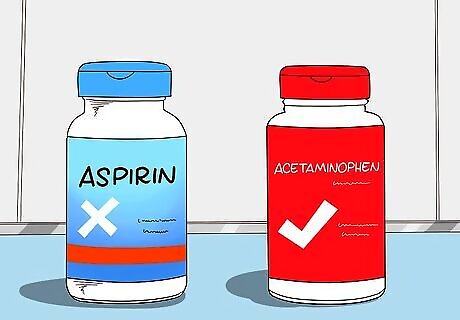
Consider switching from aspirin to acetaminophen. If you have headaches or other needs for a pain reliever, consider switching to acetaminophen. Like alcohol and smoking, aspirin promotes the development of ulcers especially in someone who has the bacteria H. pylori already present in his or her stomach. Talk about switching pain relievers with your doctor.
Maximizing the Effectiveness of Bananas
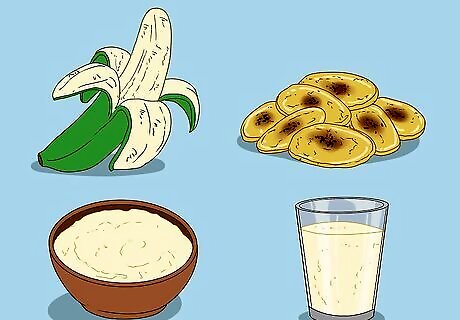
Peel, dry, crush and drink bananas. Doing this will help unlock the most effective treatment for peptic ulcers. Dried bananas contain sitoindosides which helps to increase mucus in the digestive tract, which in turn helps to prevent and heal ulcers. Unripe bananas may promote cell growth in the intestinal tract. Lastly, dried bananas contain polysaccharides, which is also found in anti-ulcer drugs.

Peel the bananas to begin your natural treatment, the banana should be unripe. You can peel the unripe banana either with your hands by gently breaking off the top and peeling down the skin, or by using a knife to cut off the top and then peeling down the skin.
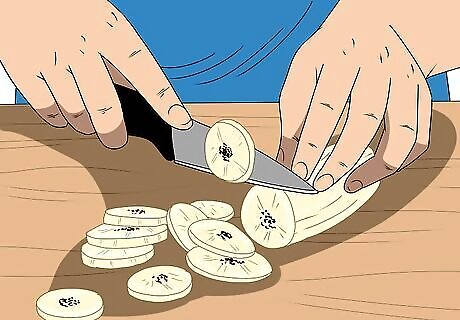
Cut the peeled bananas into 1/8th inch slices and dry them. Dehydrate the bananas by either leaving them on a baking tray in the sun for 7 days, or by placing them in the oven at 170 degrees F for five hours.
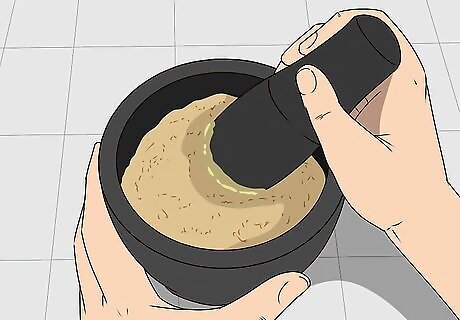
Use a pestle and mortar to grind the dry bananas into a fine powder. If you do not have a pestle and mortar, you can try putting the banana in a plastic bag and using a rolling pin or another heavy object to crush the banana.
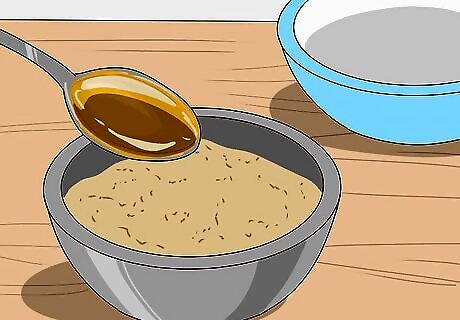
Combine two tablespoons of the crushed banana with one tablespoons of honey. Take this mixture three times per day, in the morning, afternoon and night. You can add milk or another liquid to the mixture if you prefer.
Determining If You Have Peptic Ulcers
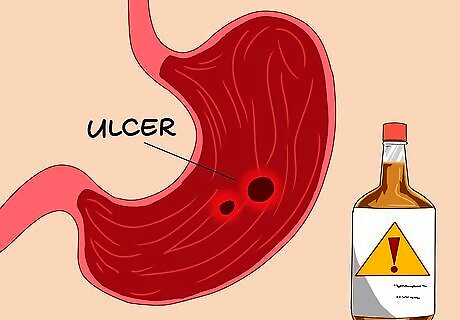
Determine if you are vulnerable. If you smoke and/or drink a lot of alcohol you are more susceptible to peptic ulcers. Alcohol reduces the mucous lining in your stomach which will increase stomach acid, while smoking increase the risk of ulcers for those with bacteria already in their stomach. Peptic ulcers were once thought to be caused by spicy food, however this is not the case. You may also be vulnerable if you have a family history of ulcers, take aspirin regularly, or are over the age of 50.
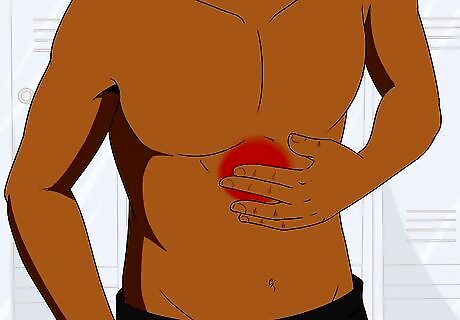
Look for the symptoms of peptic ulcers. The mild symptoms of peptic ulcers include a burning pain in the stomach between meals or at night, bloating, heartburn and nausea. In extreme cases you may experience black stool, loss of weight, severe pain or vomiting blood.

Understand the medical treatment options. Peptic ulcers are caused by a bacteria in the stomach called H. pylori. If you experience any of the severe symptoms, you should visit an emergency room immediately. If your symptoms are mild and persistent you schedule an appointment with your primary care doctor. Your doctor will most likely prescribe antibiotics and/or acid reducers to treat the ulcers.




















Comments
0 comment